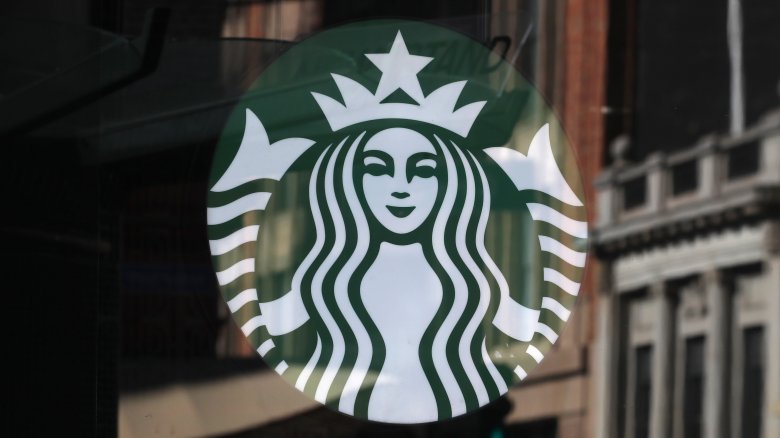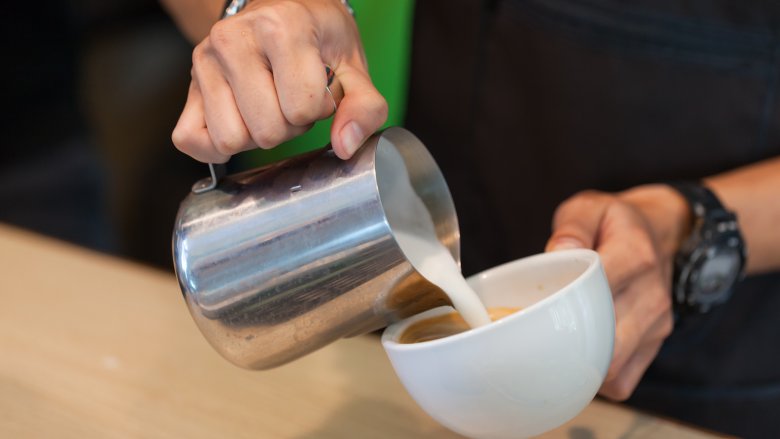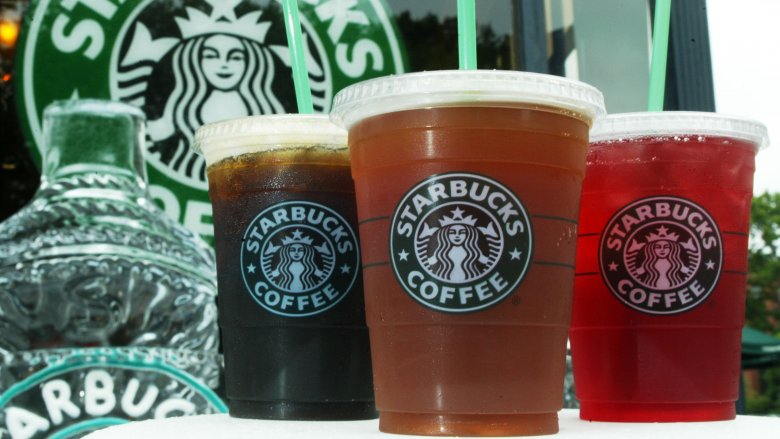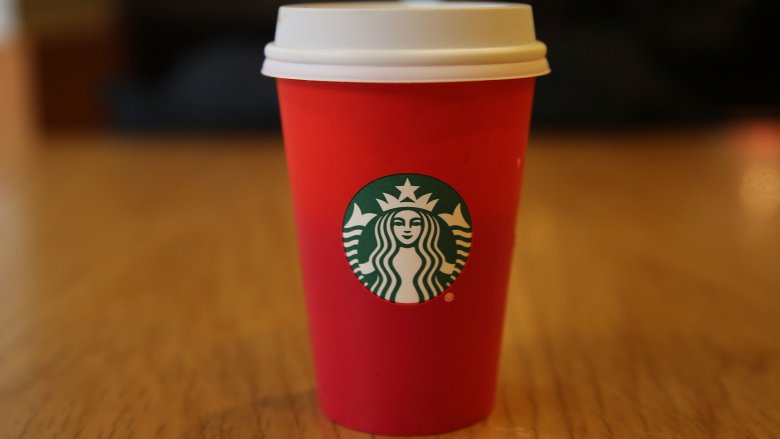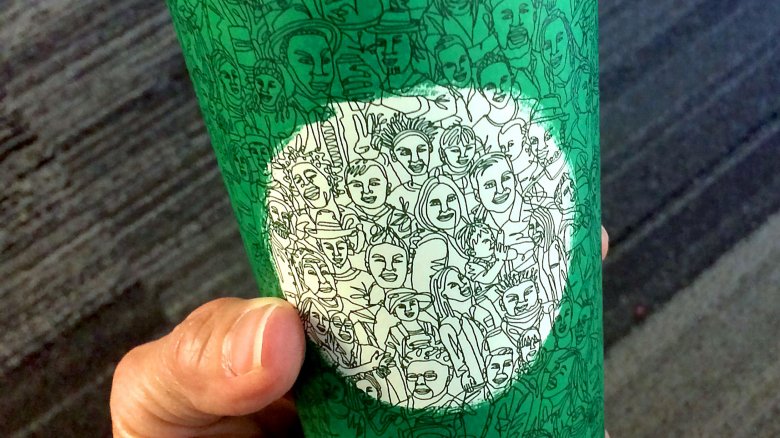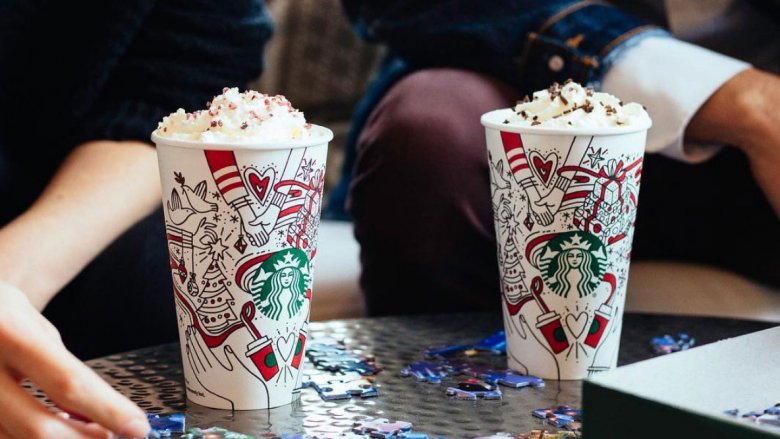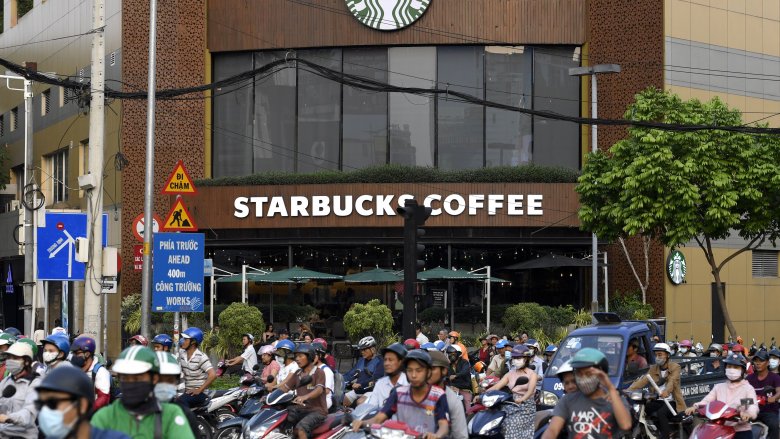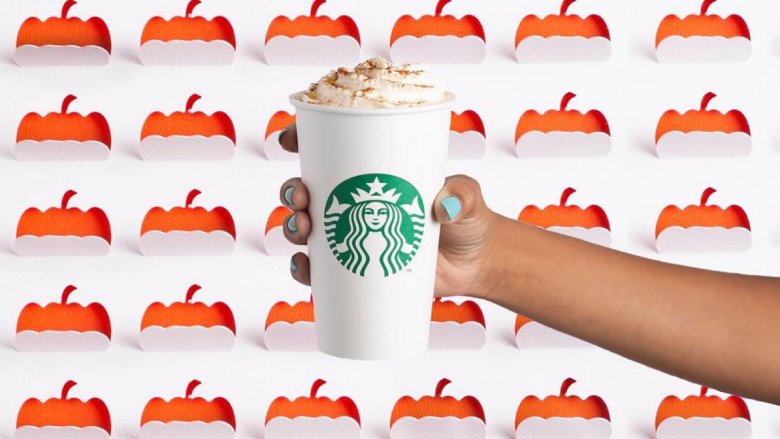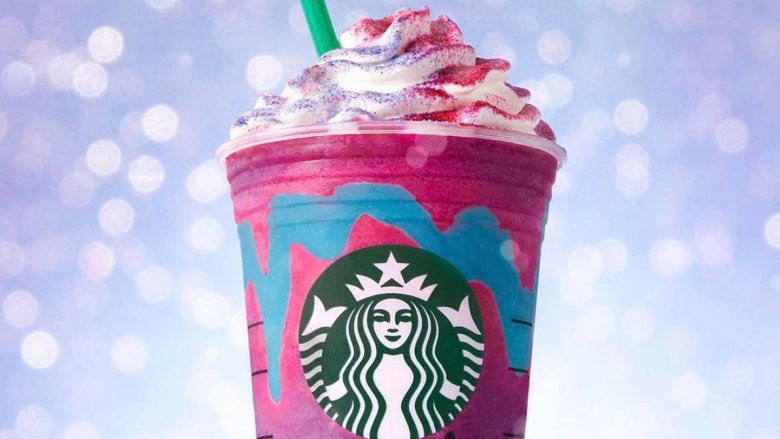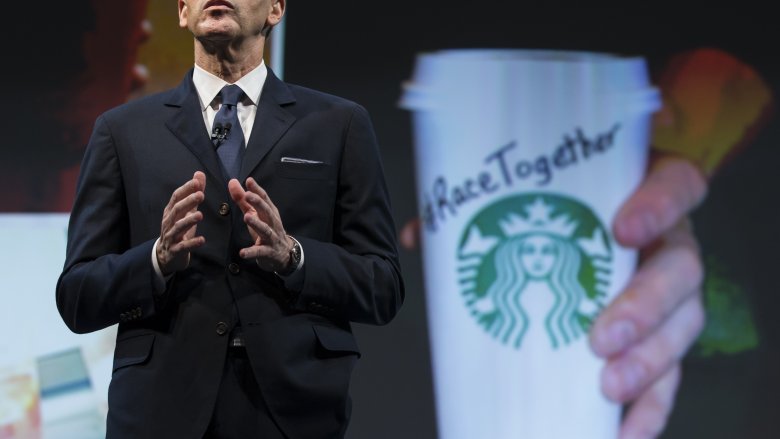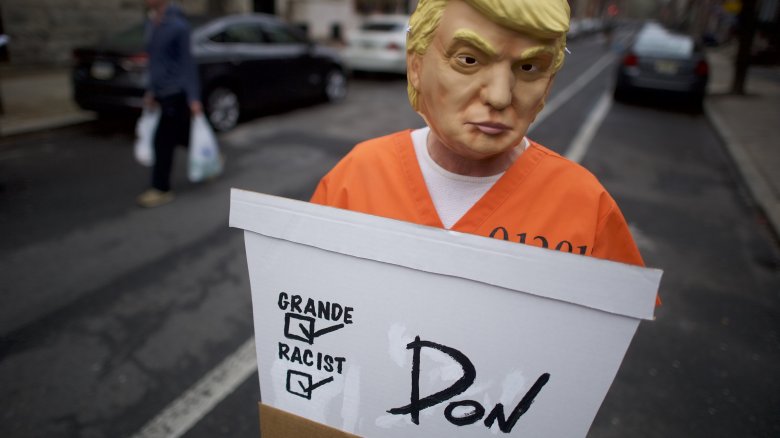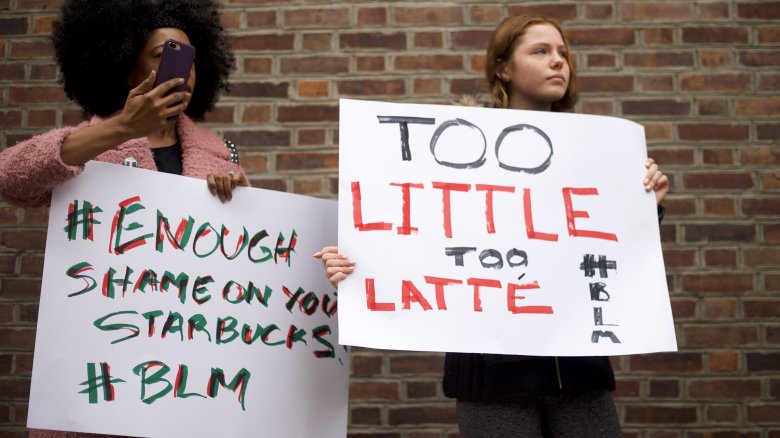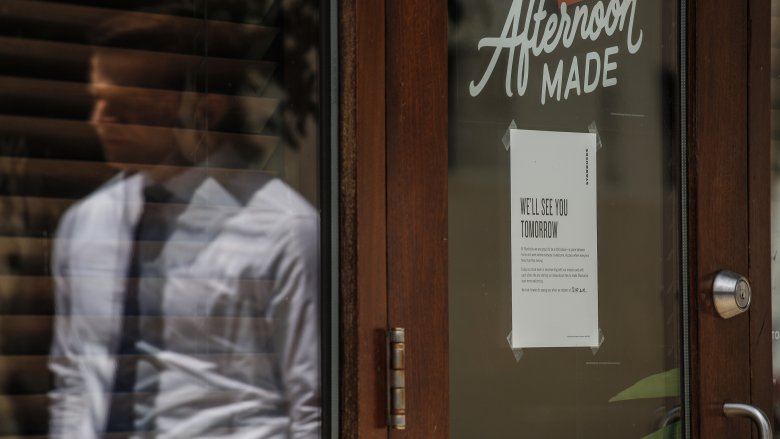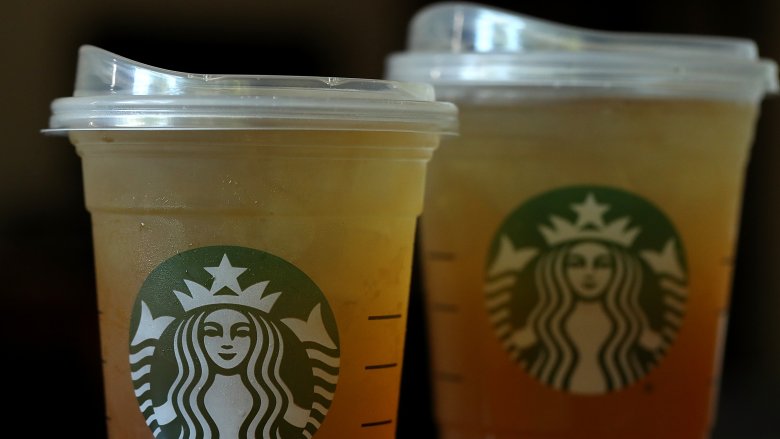The Biggest Scandals To Ever Hit Starbucks
Starbucks is known for many great things: it's is the largest coffee chain in the entire world. It's regularly named to "best" lists by both Fortune and Forbes, thanks to the way they treat their employees, the benefits they offer, and the way they run their business. Of course, it's also known for its popular seasonal lattes (who can forget the Pumpkin Spice Latte?!) and sugary Frappuccinos. But one thing the company is known for that's less than desirable is its tendency to be involved in all sorts of controversies.
They may be all about delicious coffee-flavored treats and smiling baristas, but that doesn't mean Starbucks doesn't have their fair share of problems to deal with. The coffee chain has been plagued by lawsuits (some silly, while others were no laughing matter), seemingly endless social media backlash, and even a boycott call from the President of the United States. Here are some of the biggest scandals to ever hit Starbucks — some of it's probably fresh in your mind, but you may have forgotten about a few of these.
They were sued for underfilling lattes
In 2016, Starbucks was sued by two people in California, Siera Strumlauf and Benjamin Robles, who claimed the chain underfilled lattes by 25 percent in order to cut costs. The New York Daily News reported that the lawsuit stated, "By underfilling its lattes, thereby shortchanging its customers, Starbucks has saved countless millions of dollars in the cost of goods sold and was unjustly enriched by taking payments for more product than it delivers."
Strumlauf and Robles said the company had a "systematic conspiracy" to make sure the steamed milk never reached the correct full line. Starbucks released a statement to Eater saying they fully believed the lawsuit was "without merit. We are proud to serve our customers high-quality, handcrafted and customized beverages, and we inform customers of the likelihood of variations."
In the end, CNBC reported that Starbucks had been granted dismissal of the lawsuit. A U.S. District Judge said there was a lack of evidence that the company was underfilling lattes, and rejected the idea that milk foam should not count towards the correct volume, saying that most customers expect foam to take up room and that it was necessary in order to make a latte.
They were also sued for using too much ice
Around the same time of the underfilling lattes lawsuit, the company was dealing with two other lawsuits for something similar: using too much ice in iced beverages. One lawsuit, filed by Chicago resident Stacy Pincus, claimed that Starbucks instructed baristas to fill iced beverages with much more ice than liquid in an attempt to make money. The New York Daily News reported that the Chicago class-action lawsuit wanted $5 million, for Starbucks to repay any customer who bought an iced drink in the past 10 years. That lawsuit was dismissed a few months later.
An almost identical lawsuit was happening in California, at the same time. Los Angeles resident Alexander Forouzesh sued the company for underfilling cups with fluid, saying that even without ice, there wasn't enough liquid in an iced beverage. A few months later, the Washington Post reported that U.S. District Judge Percy Anderson, of the Central District of California, dismissed the case, saying, "When a reasonable consumer walks into a Starbucks and orders a Grande iced tea, that consumer knows the size of the cup that drink will be served in and that a portion of the drink will consist of ice. Because no reasonable consumer could be confused by this..."
Their "war on Christmas" with plain red cups in 2015
During the holiday season, Starbucks is known for two things: extra sugary seasonal drinks, and cups that celebrate the Christmas spirit. But in 2015, the company decided to take a more non-denominational stance with their cups. Instead of doing a Christmas-themed design, they debuted simple red cups. In a statement about the cups, the vice president of the company, Jeffrey Fields, said, "In the past, we have told stories with our holiday cups designs. This year we wanted to usher in the holidays with a purity of design that welcomes all of our stories."
Some customers, however, were not pleased. Joshua Feuerstein shared a video on his Facebook page where he said "political correct-ness" had prompted Starbucks to "take Christ and Christmas off their cups." He started a "movement" to go into Starbucks and say your name is "Merry Christmas," so that employees were forced to write that on the cups. The video went viral, and Feuerstein told CNN, "I think Starbucks has gotten the message that the Christian majority in this country has awakened and are demanding that our voice be heard." Much social media backlash ensued, with many backing Feuerstein, and many defending Starbucks.
Even then-presidential candidate Donald Trump weighed in on the issue, saying "I have one of the most successful Starbucks, in Trump Tower. Maybe we should boycott Starbucks? I don't know. Seriously, I don't care... If I become president, we're all going to be saying Merry Christmas again, that I can tell you."
The Green Cup in 2016 was a problem as well
In November 2016, Starbucks made a big statement when they released their new "Green Unity Cup." The cup was meant to symbolize unity before the 2016 election. It was designed by artist Shogo Ota, and featured hundreds of different types of people, drawn in one continuous line. In a statement, Starbucks CEO Howard Schultz wrote, "The green cup and the design represent the connections Starbucks has as a community with its partners (employees) and customers. During a divisive time in our country, Starbucks wanted to create a symbol of unity as a reminder of our shared values, and the need to be good to each other."
Again, there was social media backlash. According to NBC News, some Twitter users were threatening to boycott the company for "liberal bias, while others said they only wanted coffee from the chain, not political commentary. Other customers were just unhappy that, once again, the cup didn't have a Christmas-theme.
The homosexual holiday cup of 2017
The holiday cup controversy didn't stop in 2016. The following year, a more festive, holiday-inspired design still incited backlash after Buzzfeed News wrote an article about how the design was "totally gay." The outlet reported that many social media users felt that the design, which featured two hands being held, was an image of two same-sex hands, with most posters agreeing that they were two women. Starbucks did not confirm or deny that the hand-holders were of the same sex, but released a statement saying, "Each year during the holidays we aim to bring our customers an experience that inspires the spirit of the season, and we will continue to embrace and welcome customers from all backgrounds and religions in our stores around the world."
The New York Times reported that many customers were furious over the fact that the hand holding might be between a gay or lesbian couple. Conservative site The Blaze wrote a blog post about how the company was being celebrated for pushing a "gay agenda." Overall, it was just another holiday cup controversy.
They said they would hire refugees — and people weren't having it
In January 2017, Schultz released an official statement announcing that Starbucks would be hiring refugees after President Donald Trump issued an executive order that banned people from several Muslim countries from entering the United States. He wrote, "We have a long history of hiring young people looking for opportunities and a pathway to a new life around the world... There are more than 65 million citizens of the world recognized as refugees by the United Nations, and we are developing plans to hire 10,000 of them over five years in the 75 countries around the world where Starbucks does business."
The decision quickly resulted in a lot of social media backlash. Fortune reported that the hashtag #BoycottStarbucks was the highest trending topic on Twitter the morning after the announcement was made. Some Twitter users were furious by the company's decision, saying things like "What about us?" Other users were so happy with the announcement that they were promising to continue spending their money on Starbucks coffee.
The pumpkin-less Pumpkin Spice Latte
If there's one sugary sweet latte Starbucks is most known for, it's the seasonal Pumpkin Spice Latte that rolls around every year. At first, it seemed that the famed PSL could do no wrong: it was a fall favorite with a cult-like following. But in 2015, controversial food blogger Vani Hari, also known as Food Babe, wrote a post revealing there was no actual pumpkin in the Starbucks Pumpkin Spice Latte. Hari listed many of the other ingredients in the drink, tearing them apart for being unhealthy.
The post went viral, even prompting a response from Starbucks. According to Fortune, director of espresso Americas for Starbucks Peter Dukes wrote a blog post saying, "After hearing from customers and partners about ingredients, we took another look at this beverage and why we created it so many years ago." He added that there would be some changes, including the addition of real pumpkin, and the removal of caramel coloring.
They were accused of stealing their unicorn drink
In April 2017, Starbucks got tons of attention for their newest limited-edition menu item: the Unicorn Frappuccino. Made with mango syrup, layered with sour blue drizzle, and topped with whipped cream and sweet pink and sour blue powder toppings, the drink was colorful, bright, and very Instagram-worthy. Unfortunately, it also led to a lawsuit. In May 2017, the New York Post reported that the parent company of Brooklyn cafe The End Brooklyn sued Starbucks in a $10 million trademark infringement lawsuit, saying that their customers now assumed they were getting a "copy-cat or knockoff" of the Starbucks drink, when theirs was actually out first.
The End had started selling a "Unicorn Latte" in December 2016, and court papers said it was a "successful and popular product." They even applied to trademark the name on January 20. Starbucks spokesman Reggie Borges responded to Business Insider, saying, "We know about the claims and we believe they are without merit. The Starbucks Unicorn Frappuccino blended beverage was inspired by the fun, spirited and colorful unicorn-themed food and drinks that have been trending in social media."
The lawsuit was settled out of court, but details were not disclosed.
They tried and failed at the Race Together campaign
In 2015, Starbucks went through one of their most epic fails ever: the Race Together campaign. That year, Starbucks launched a week-long campaign called "Race Together" in an effort to get their employees and customers to talk about race. In a statement, Schultz asked partners to write "#RaceTogether" on cups to start a conversation, saying, "we at Starbucks should be willing to talk about these issues in America. Not to point fingers or to place blame, and not because we have answers, but because staying silent is not who we are." A USA Today supplement included a variety of "conversation starters."
Starbucks may have meant well, but the Race Together campaign definitely did not go as planned.
According to Fast Company, Race Together got 2.5 billion social media impressions in less than 48 hours, mainly of full of backlash against the campaign, which was called superficial, tone-deaf and insensitive, among other things. Business Insider would later call it Starbucks' "most embarrassing moment in history."
Schultz defended the campaign to employees, saying, "While there has been criticism of the initiative — and I know this hasn't been easy for any of you — let me assure you that we didn't expect universal praise." He added, "We leaned in because we believed that starting this dialogue is what matters most. We are learning a lot. And will always aim high in our efforts to make a difference on the issues that matter most."
#TrumpCup turned things political
In 2016, Starbucks went through more political controversy. Trump supporters started saying their name was "Trump" when ordering to get the baristas to yell the name out when the drink was ready. Many then posted pictures of their cups, captioned #TrumpCup.
The whole thing was started by Tim Treadstone, who told the Washington Post that he began the campaign after he saw a video where a Starbucks employee refused to write Trump's name on a customer's coffee cup. Treadstone said, "We have a culture war to win. I'm a Trump supporter." He added, "We have a lot of work to do. We have hearts and minds to win. Obviously, a lot of people aren't happy with us, and we need to stand up for our freedom and our First Amendment."
#TrumpCup got so big, with both supporters and backlash, that Starbucks was forced to respond. In a statement, they said they liked to write customer's names for "fun," adding, "Rarely has it been abused or taken advantage of. We hope and trust that our customers will continue to honor that tradition. We don't require our partners to write or call out names."
Racial profiling in Philadelphia
Probably the biggest Starbucks scandal ever happened in 2018: Two black men were sitting in a Philadelphia Starbucks when they were arrested for not making a purchase. The manager of the store called the police and said that two men were sitting in the store when they hadn't bought anything and they refused to leave. The eight-minute video clip on YouTube that quickly went viral shows the police officers standing around the two black men, who were calmly answering questions, telling officers they were meeting someone there. After a few moments, the white man who was supposed to meet them arrived, argued with the officers and said they were acting discriminatory, and then the officers arrested the two black men on suspicion of trespassing.
The arrests caused immediate backlash and cries of racism, along with boycotts and protests against the coffee chain. It prompted a public apology from Starbucks CEO Howard Schultz, who said in an interview on CBS News, "I'm embarrassed, ashamed. I think what occurred was reprehensible at every single level." Starbucks released an official statement apologizing to the two men who had been arrested, and saying, "Starbucks stands firmly against discrimination or racial profiling."
Their racial bias training drew more controversy
The arrest scandal was so big that even Starbucks knew they had to do something bigger than just release a public apology. A few weeks after the incident, the company announced that they were planning to close more than 8,000 United States stores for several hours on May 29, 2018 in order to conduct racial-bias training for employees. They also released a video that highlighted the training curriculum, saying that day would only be the beginning of weeks, months, and years of discussing things like race, class, language, and more with employees.
Still, even this attempt to make things right didn't sit well with everyone. Some felt that it wasn't the right approach to the issue at hand, while many customers were simply annoyed that their store might be closed for a few hours. In the end, not all employees were impressed.
Mohamed Abdi, a Starbucks employee in Virginia, told TIME that he wanted to hear more discussion from coworkers rather than just watching a video. One African-American employee named Jason said, "Helpful? [I don't know]. It kinda reaffirms things that I know already."
A Mexican employee named Alicia told the publication, "They told us we need to be 'color brave' instead of color blind and it was the whitest thing I've ever heard... Me and my coworkers of color felt uncomfortable the entire time."
Starbucks said they were ditching plastic straws
In 2018, Starbucks joined the overall conversation about finding ways to be more environmentally conscious when they announced that they would be getting rid of plastic straws. Instead of straws, the company said they would begin using "strawless" plastic lids. In a statement, the company wrote, "Amid ongoing company conversations about reducing waste and safeguarding the environment, Starbucks is announcing today that it will phase out plastic straws from its more than 28,000 stores worldwide by 2020, a decision that will eliminate more than 1 billion straws a year."
Many customers applauded the company's efforts to try to make a difference in the amount of plastic used, but not everyone was thrilled with the decision, especially the disabled. Katherine Carroll, policy analyst at the Rochester, New York-based Center for Disability Rights, told TIME, "Plastic straws are an accessible way for people with certain disabilities to consume food and drinks, and it seems the blanket bans are not taking into account that they need straws and also that plastic straw replacements are not accessible to people."
"It's good that they are reacting to customer concerns, but a company as big as Starbucks should pay attention to disabled customers' needs and produce assessable straws," added disabled rights advocate Jamie Szymkowiak.
